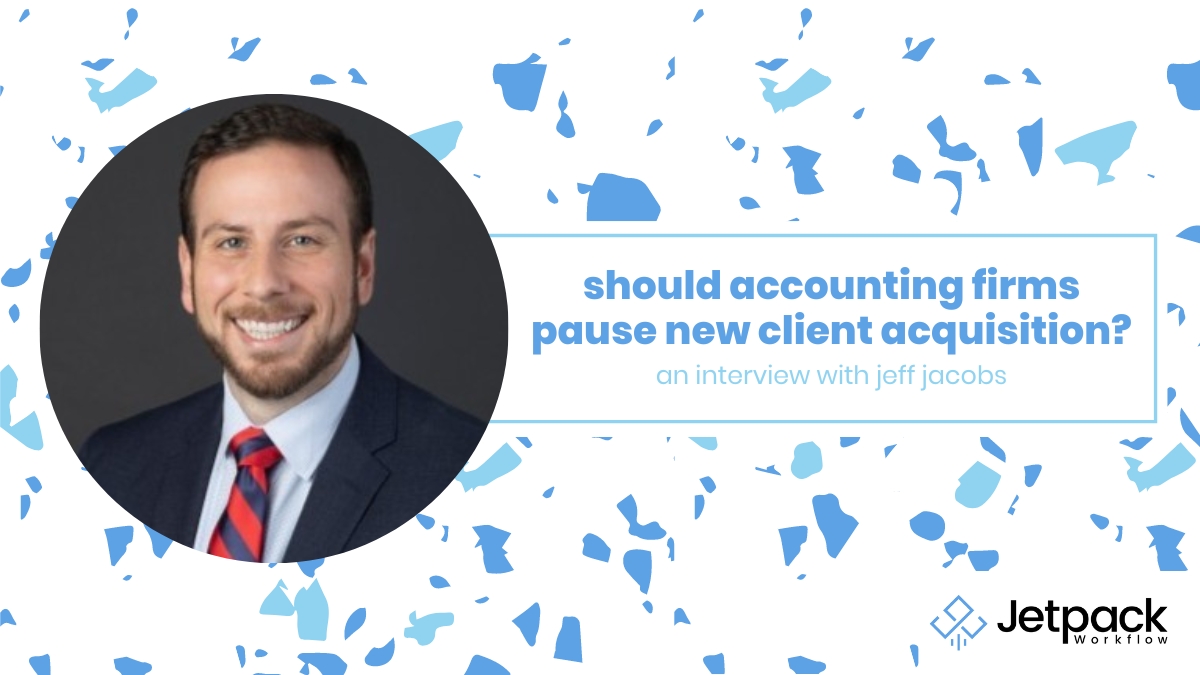Should Accounting Firms Pause New Client Acquisition?

Summary
-
- On today’s episode we sat down with Jeff Jacobs, and talked about retention, hiring, development, and most importantly, relationships.
Resources found below:
About Jeff Jacobs
Jeff, a fan of our show, is the Director of Development at Wilkins Miller. Wilkins Miller is a top 400 Accounting firm in Mobile, AL. He started his career in IT business development and soon transferred to development, which we will cover throughout. Ultimately, Jeff is in the pursuit of new clients and new business.
New Business vs. Old Business
An interesting question was brought forth by David Cristello, founder and CEO of Jetpack Workflow, asking, “What do you think about this pie chart today of time spent on expansion with current versus new (business)?” In nearly everyone’s world today, businesses are experiencing ‘people issues’ as Jeff calls them. Capacity and retention issues to be more specific.
It should not be news to us that businesses are finding better outcomes when they focus on their current relationships before they focus on expanding into new ones.
This is similar to the P/PC balance principle taught by Stephen Covey. If P represents production or golden eggs (the results we want) and PC represents production capability or the goose that lays golden eggs (what produces the results), it would be essential to take care of the goose that lays the eggs, just as much as the eggs themselves.
In other words, a focus on current relationships keeps the golden eggs coming.
Relatable Talent
As Jeff mentioned, most businesses in today’s economy are experiencing people issues. This could be hiring, retention, overall development—the works. Jeff touches on the question posed by David, “Where do you find relatable talent?”
Jeff encourages us to look into industries that have a ‘complex sale.’ Some industries he mentioned are:
-
- Insurance
-
- IT
-
- Professional services
-
- Consultative services
The idea here is that if firms are seeking talent that is relevant to their root goals, looking in industries that are difficult to sell in may be a good start. The consultative piece is crucial here as well. In sales, it is less about offering a product and more about building relationships. This fits right into the idea brought forth by Jeff—focusing on current relationships is where the sweet spot is.
A Director of Development can:
-
- Identify which relationships need nurturing
-
- Define where growth is necessary
-
- Build teams that are founded on sales ideology, but focused on customer relationships
-
- Enable teams to go out and sell
To quote Jeff, “We’re better together than we are as an individual.” This is entirely true. It’s actually a common theme you’ll hear again and again from the interviewee’s in our podcasts.
Having a role like Jeff is in, can help firms grow their business and nurture their current relationships; two pieces that are equally important to the bottom line.
Get everything you need to manage projects and meet deadlines.
Subscribe to our weekly newsletter, and get 32 free accounting workflow templates today!
sign me up!
Sales enablement
According to Jeff, sales enablement is education and teaching the team about service lines. We love it when he says, “…they need to understand why we want to grow.” The why is essential in all things, because it’s literally why we do them!
It is one thing to understand that growth is a part of what the expectation for staff is, however it’s further necessary for staff to understand why the growth is important. Jeff gives some interesting statistics from Hinge Marketing.
-
- 5% of client bases leave through natural attrition
-
- 19% are one time projects that don’t carry over year over year
Based on this data, it would make sense to explain to our teams that every year 24% of the revenue is walking out of the door. This is why we’re so focused on growth. Then, a team can buy into helping solve the problem.
Jeff ties all ideas discussed in the podcast together when he talks about how clients want to know that we (the service provider) are interested in the success and growth of their businesses.
Proactive communication is key. Within the accounting industry, it’s easy to get solely focused on the bottom line… “It’s sort of the job right?” explains Jeff. Although true, Jeff has taught us the importance of client/service provider relationships. And, what’s the heart and soul of showing the client we care? Communication about their business, of course. Stephen Covey calls this, ‘emotional bank deposits.’
Jeff shares that he will have proactive phone calls with his clients with the agenda of two questions:
-
- How are you?
-
- How are we?
These questions will lead to deeper conversation, which is really the point. By scheduling check-ins, it shows clients that:
-
- We care
-
- We’re focused on their success and want to hear how their business is going
-
- We’re proactively identifying what is needed next which helps us do our jobs better
7 Habits
Our conversation with Jeff today exposed many of the 7 Habits of Highly Effective People, a book written by Stephen Covey. Thus, the multiple citings of his ideas.
All in all, the ideas expressed by Jeff are merely an example of the habits, and shows that he himself may practice ideas from the famous book. Which by the way, has sold over 25 million copies in 38 languages. The book was also named the #1 Most Influential Business Book of the 20th century.
It might just be something to pay attention to.
The 7 Habits are:
-
- Be Proactive
-
- Begin with the end in mind
-
- Put 1st things 1st
-
- Think Win-Win
-
- Seek first to understand, then to be understood
-
- Synergize
-
- Sharpen the Saw
It was a pleasure to have Jeff on our podcast. Check out ways to get in touch with him below:





